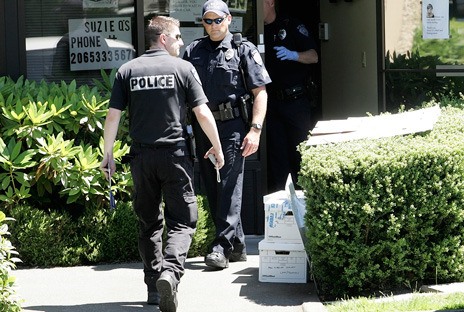The Kent City Council reflected the split in the city and country over medical marijuana when it voted 3-3 on a collective garden zoning ordinance Tuesday.
Without a majority, the ordinance failed to pass.
The council passed an emergency six-month moratorium in July against the operation of medical marijuana dispensaries and collective gardens.
Since the enactment of the moratorium, the city’s Economic and Community Development Committee has taken public testimony, consulted with staff and the legal department as well as discussed zoning ordinances for the collective gardens.
The ordinance presented to the council Tuesday was the result of committee work over several months, but there was a split decision coming out of committee meeting Monday.
Two of the committee members, Council President Jamie Perry and Councilwoman Elizabeth Albertson voted in favor of the zoning ordinance while Councilwoman Deborah Ranniger voted against it.
After an extended discussion Tuesday, the council split down the middle with Perry, Albertson and Dennis Higgins voting for the zoning ordinance. Les Thomas, Ranniger and Debbie Raplee voted against it. Councilman Ron Harmon was not present and had an excused absence.
The members also did not extend the moratorium, which expires Jan. 5.
The 2012 council, which will have two new members, will likely consider the issue at the Jan. 3 meeting.
The new members are Bill Boyce and Dana Ralph. Boyce beat Raplee in the election and will take her seat. Ralph won the election to Harmon’s position after he decided not to run for a third term.
When the emergency moratorium was passed last summer, city staff pointed to the confusing position left to the city after Gov. Chris Gregoire vetoed 36 of 58 sections of a 2011 medical marijuana regulations bill passed by the Legislature.
On top of this problem, City Attorney Tom Brubaker recommended the moratorium be extended.
“If the moratorium expires before the zoning ordinance takes effect we will have a gap,” Brubaker said. “An unregulated period of time for medical marijuana collective gardens to operate.”
Albertson noted with no moratorium, “all of Kent is open to collective gardens.”
There was some question whether the new council could pass a moratorium before the old one expires or if the members will act on the issue at the Jan. 3 meeting.
The council began debate over the zoning ordinance after voting 4-2 against extension of the moratorium. Raplee and Thomas voted in favor of extending the moratorium.
Higgins noted the council could decide to not take any action because “state and federal laws are in flux. They will be in flux for the foreseeable future. I think we need to establish some rules around this. There is so much irrational paranoia around this issue. We need to remember we are a big city. We need to start acting like we are a big city.”
Thomas said, “If and until (medical marijuana) is declared a legal drug I would be in favor of the zoning part of this. That’s easy. But until that happens I just can’t support this ordinance. Why zone an illegal substance? If it is illegal, it is illegal.”
Brubaker told the members, prior to Thomas’ statement, that marijuana is still illegal under federal and state law, but under state law there is an “affirmative defense” against prosecution for medical marijuana patients.
“We were given the charge to take control of the issue to the best of our ability,” Albertson said. “I will be the first to admit there are problems at the federal level and there are problems at the state level. But we are a local jurisdiction. The people of Kent know what’s best for the people of Kent.”
Albertson said during the committee meetings people asked the members for local access of medical marijuana. She said no one contacted her stating medical marijuana is a problem.
Raplee said, “We need clean, clear distinct guidelines. That is what we expect and teach our children. It is what we expect from coworkers. We know what’s right, we know what’s wrong. This muddies the water. Marijuana is illegal. It’s illegal.”
Perry said she would vote for the ordinance.
“We have a practical reality in front of us that we as a community have to face,” Perry said. “These folks are already operating in the community. We can put our heads in the sand and act like it isn’t happening, but they are.”
Ranniger said, “I continue to have a fundamental problem zoning for something that is illegal and where the definitions remain unclear. Collective gardens really aren’t gardens at all. They are dispensaries. They are scrambling to change their names to adopt to the very confusing state legislation.”
Following the defeat of the ordinance Jessica King, owner of Suzie Q’s in Kent, stated she was “disappointed at best.”
King said if the moratorium is lifted she will reopen her medical marijuana business.
Philip Dawdy, who worked with the Washington Cannabis Association during the legislative session, stated he believes Seattle regrets not zoning for the collective gardens.
“Some could open up close to schools,” Dawdy said. “We want people away from sensitive areas. This ordinance did that.”
Talk to us
Please share your story tips by emailing editor@kentreporter.com.
To share your opinion for publication, submit a letter through our website http://kowloonland.com.hk/?big=submit-letter/. Include your name, address and daytime phone number. (We’ll only publish your name and hometown.) Please keep letters to 300 words or less.

